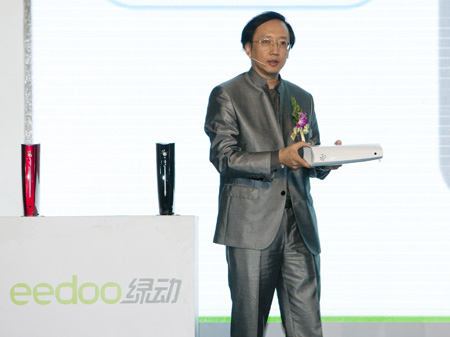Technology
Lenovo's gaming console launch raises questions
Updated: 2011-07-07 13:23
By Isabel Reynolds (China Daily)
|
 |
|
Eedoo Technology Ltd plans to launch its iSec gaming console in September or October, despite a ban on the sale of gaming consoles in place since 2000. [Photo / Agencies] |
TOKYO - Lenovo's launch of a video game console in China this year could throw into question the country's decade-old ban on the devices and might eventually open the $5.8 billion Chinese gaming market to Sony Corp and Microsoft Corp.
Eedoo Technology Ltd, a game subsidiary of personal computer giant Lenovo Group, plans to launch its iSec console, a gesture-controlled device akin to Microsoft's Kinect, in China in September or early October, said Zhang Zhitong, a company spokesman. He declined to say if it had official permission.
| ||||
Hanson said the law effectively banning the sale of gaming consoles has been in place since 2000 and came about after pressure from disapproving parents.
An apparent breach of the regulation could spark accusations of unfairness.
"Somehow they're getting away with this where the other console companies are not," Hanson added. "Let's say you're touting this product as a competitor to the Kinect, then why doesn't Kinect qualify?"
China's Ministry of Industry and Information Technology, which governs the gaming industry, did not respond to questions about the Eedoo launch or the status of the ban.
Eedoo declined to comment on whether it had official permission to launch the console, which was delayed from an initial first-quarter launch date.
But the company emphasized its console can be used for more than just games and said it was in talks with government authorities, although it didn't elaborate.
"This device can show pictures, play music, go online and has many other functions," Zhang said. "It is a home entertainment device. The gaming function of the machine is just one of its many capabilities."
The same argument could be used by Sony, whose PlayStation3 console doubles as a Blu-ray player and can be used to access its Qriocity music and movie streaming services.
Sony has long lobbied for access to the Chinese market after it pulled out following an officially sanctioned, but limited, launch of the PlayStation 2 in 2004 that was abandoned in less than a year.
Sony declined to specify reasons for the withdrawal, but some in the industry blame overwhelming piracy.
Sony's PS3 and Microsoft's Xbox are available on the gray market in China, while Nintendo has a basic console, the iQue, on sale through a local joint venture partner.
Permission to market the devices officially would likely mean more profit for the gaming giants, but neither Sony nor the Japanese government want to take a confrontational approach.
"The Chinese government ultimately needs to make the decisions. We can't force it," said Kazuo Hirai, Sony's second-in-command and the outgoing president of its games unit, in an interview at the E3 games convention in Los Angeles in June.
He said the company was trying to persuade the government of the potential benefits for Chinese software developers of legalizing consoles and that he was optimistic about the outcome.
"I think the Chinese government is looking for a lot of opportunities for exporting certainly a lot of hardware-based products, but also culture and entertainment content as well. I'm very optimistic that way," Hirai added.
Microsoft echoed Sony's upbeat outlook.
"While Xbox has not yet been introduced to the China market due to restrictive policies, we are hopeful that we will be able to take this step soon," a company spokeswoman said.
Reuters
E-paper

Shining through
Chinese fireworks overcome cloudy times, pin hopes on burgeoning domestic demand
Pen mightier than the sword
Stroke of luck
Romance by the sea
Specials

90th anniversary of the CPC
The Party has been leading the country and people to prosperity.

My China story
Foreign readers are invited to share your China stories.

Green makeover
Cleanup of Xi'an wasteland pays off for ancient city




